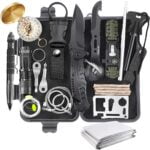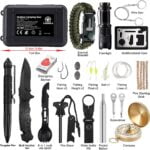- 1 Blackout, what is it?
- 2 Causes of the blackout
- 3 Could a power shortage lead Poland to disaster?
- 4 How do you survive without electricity?
- 5 Possible scenario of events in Poland in the event of a prolonged blackout.
-
6
Power outage as war – how to prepare?
- 6.1 How can you cope with a frost without electricity?
- 6.2 Water without electricity
- 6.3 Food during a blackout
- 6.4 Hygiene and health when there is no electricity
- 6.5 First aid kit and medicines
- 6.6 Lighting
- 6.7 Radio, communications and other electronics
- 6.8 When help is not forthcoming – alternate means of payment
- 7 Finally
A lot has happened in the last 2 years and is still happening. The unrest and problems associated with the covid-19 outbreak have hit everyone. Inflation is starting to reach levels we haven’t faced in decades. More and more companies are losing liquidity. In addition, a war has broken out across our eastern border that has the potential to ‘spill over’ into neighbouring countries.
Unfortunately, it seems that this is not the end of our problems. Another danger looms on the horizon: blackouts.
Blackout, what is it?
It is another word many of us have not yet known the meaning of, as was the case with the word ‘lockdown’. The word ‘blackout’ is increasingly appearing in the media, and serious people and serious institutions, including governmental ones, are starting to use it. So what is a blackout and what does it even mean?
Blackout is the term used to describe a situation in which the supply of electricity in an area is reduced or completely stopped. Such a situation can last from a few hours to even a few weeks.
A prolonged blackout is a very dangerous situation, because most of the technical achievements of our civilisation, to which we have entrusted our safety, health and often even our lives, are devices that use electricity. Can modern man even survive without electricity?
We have become so accustomed to using appliances that need electricity to function that we do not even notice its existence. In a sense, electricity has become invisible to us, just like the air we breathe. But if you think about it for a moment, you will find that practically everything we consider to be the material support of our existence is based on electricity.
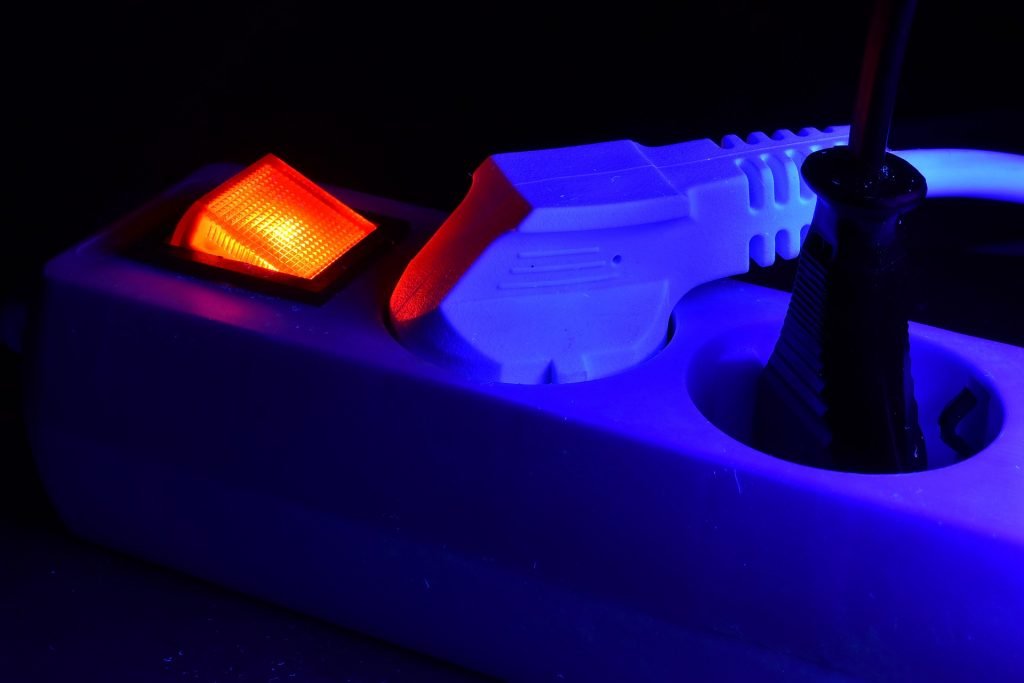
It is a system built on a system. When one element fails, everything fails
Without electricity, there is no internet. There is no water in the taps because pumps need electricity to run. There is no heating, because furnaces also need electricity. The banking system won’t work, you won’t withdraw money from an ATM, you won’t pay with a card in a shop. Only cash or alternate means of payment (about which more later) will be used for financial transactions. We will not even be able to fill up our car.
What we are looking at is an armageddon scenario, comparable in its consequences to military action by a hostile army.
Causes of the blackout
So what are the causes of this state of affairs? There are at least several.
Firstly, we are dealing here with the planned and deliberate actions of the Russian Federation. It is no secret that Russia treats the supply of natural gas to Europe as a tool of political and economic pressure. At the end of December 2021, Russia turned off the tap on the Yamal gas pipeline, which is the main pipeline supplying gas from Russia to Europe.
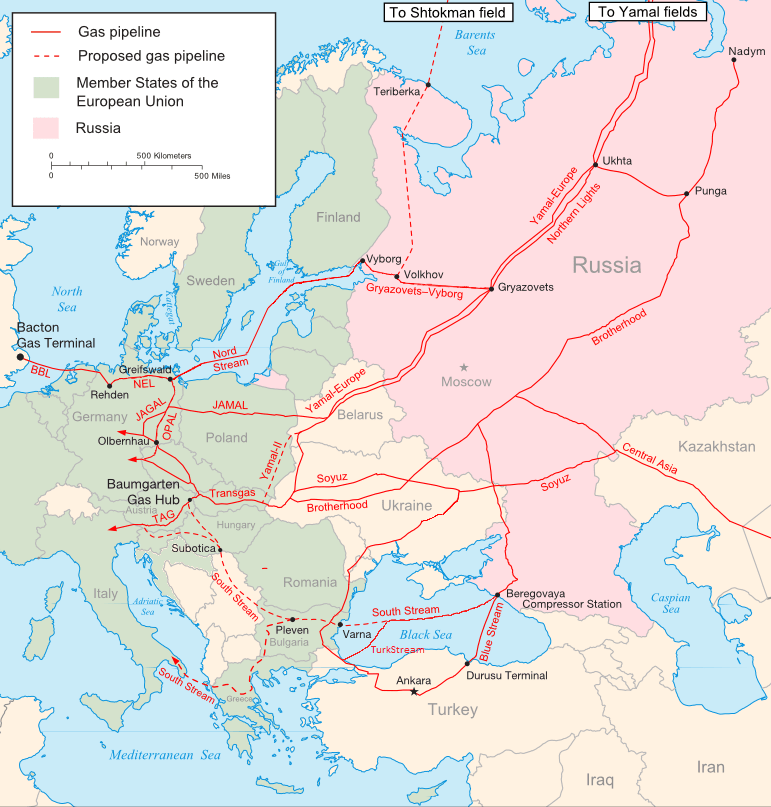
This caused a sharp increase in natural gas prices on world markets. This, in turn, led to a lot of turbulence on world energy price markets and drove up electricity prices significantly. As a consequence of these measures, several energy supply companies went bankrupt in Germany. But this is only the beginning of the problems.
The second reason will be the over-reliance on so-called green energy sources. Unlike traditional fossil fuels, renewable energy sources are much more dependent on weather conditions.
A cold and windless winter, for example, can, on the one hand, cause significant drops in the output of wind power plants and, on the other hand, trigger a higher-than-normal demand for electricity to heat residential buildings, for example. That is why the usually green Germany has recently been returning to ‘dirty’ energy derived from coal.
The Swedes were forced to import electricity from Poland for the second time at the end of December 2021. This was a repeat of history from February, when the closure of the Ringhals 1 nuclear reactor, combined with a cold winter, led to a shortage of electricity in the Swedish market.
The reality is that the Energy market in Europe is a set of interconnected vessels. Sometimes we are the ones buying energy from abroad, sometimes we are the ones selling it. Recently, however, it is Poland that has been exporting more and more electricity, becoming a net importer.
Despite the obvious problems posed by so-called green energy sources, the European Union is pushing Poland and forcing it to close mines and shut down “dirty” power plants, which could further deepen the energy crisis.
A third reason could be infrastructure failures. Here is an example from 2021. On Monday, 17 May, at 4:34 p.m., there was an emergency shutdown of the PSE Rogowiec transformer station, which received electricity from 10 of the 11 power units of the Belchatow power plant. This led to a sharp drop in power in the Polish power grid, by as much as 16%. Numerous emergency procedures were activated, including obtaining the necessary power reserves from a number of small conventional units, which provided an emergency reserve. Power was also imported from several European countries. The impact of the accident was felt even in Turkey and Africa.
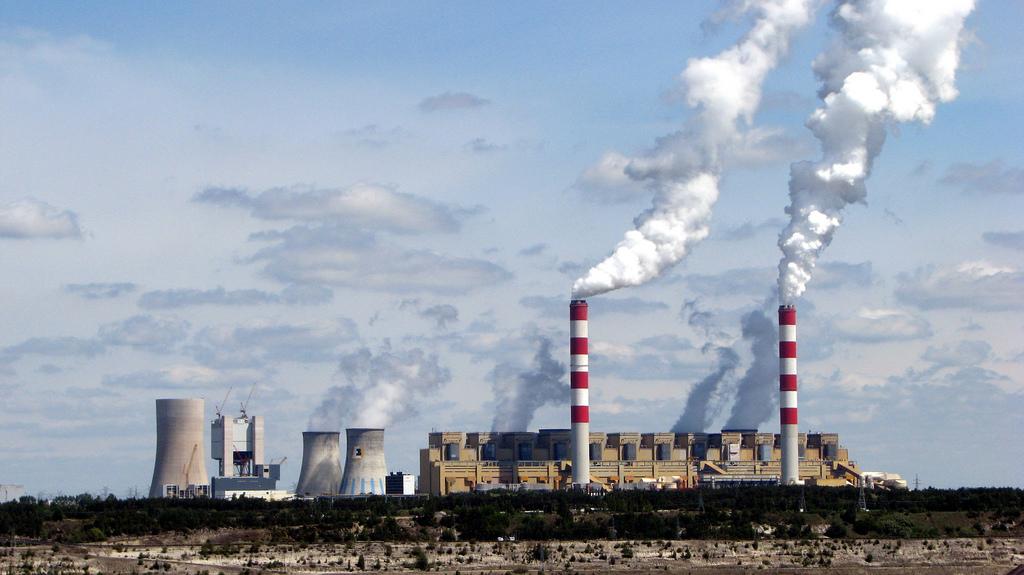
atrubucja: fotopolska.eu
Although the above situation fortunately did not lead to a catastrophe (although, in fact, it was very close), it gives us a foretaste of what can happen when several unfavourable circumstances overlap: unfavourable weather factors, the failure of large power units and the aggressive actions of the Russian Federation.
It is not only frost that can cause energy supply problems. Drought can also have similar effects, as we had an example of in Poland in 2015. Low water levels in rivers then caused cooling problems at the Połaniec and Kozienice power plants. As a consequence, the power plants reduced power transmission, which in turn led to the introduction of so-called power supply stages across the country (to be discussed later in this article).
A fourth cause may be the so-called coronal mass ejection (CME). This has already happened in the past, in 1859, fortunately at a time when electricity was not yet as important to people as it is today. A CME can destroy the entire electrical infrastructure and unprotected equipment over a very large area, or even the entire Earth, in a matter of moments. You can read more about it here: Solar EMP triggered global atmospheric anomalies.
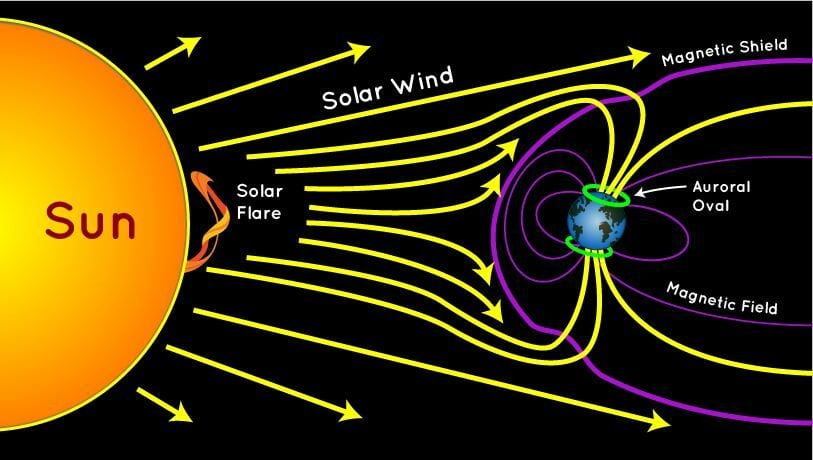
The fifth cause here could be a terrorist or military attack on infrastructure. This does not necessarily have to be a physical attack – it is enough if someone hacks into the ICT system that manages a power station or several power stations. In an extreme case, a hacker could take complete control of the power plant. This scenario is probably clear enough that I don’t need to elaborate on it – anyone can answer further for themselves.
[UPDATE] The outbreak of war in Ukraine, has made it increasingly realistic to consider a scenario in which foreign troops, by attacking with conventional or nuclear weapons, disable elements of our energy infrastructure. All it would take is for the enemy to attack 3-4 sensitive power stations within our country and we would all be going back to the Stone Age, at least until the power grid is restored – and that may take no telling how long.
As I mentioned earlier, the entire energy system in Europe, is a set of interconnected vessels, and while in the past we have been able to cope with individual problems in the supply and production of electricity, the overlap of several adverse factors can lead to a real catastrophe.
Could a power shortage lead Poland to disaster?
Although Polish operators reassure by claiming that Poland is not threatened by blackouts, their assurances are largely based on the possibility of importing energy from neighbouring countries, mainly Germany, Sweden, Lithuania and Ukraine.
Unfortunately, many of our neighbours, from whom we would “borrow” electricity, have their own power shortage problems. In theory, the operators assure us that we are also prepared for such a situation, but personally, I do not fully trust these assurances.
A clue may be found here, in a message published by the Government Security Centre on Twitter, in which it informs rather laconically how to prepare for power cuts:
The German and Austrian governments have also recently warned against blackouts.
The Austrian defence minister has officially warned of Europe-wide blackouts. The Austrian government takes the potential threat so seriously that it has even launched a public education campaign to help people prepare for blackouts.
Here we have an instructional video, prepared by the Austrian government. It outlines the scenario of a possible blackout and discusses ways to survive. The video was added to YouTube in October 2021.
Interestingly, the Austrians recommend that there should be food stocks at home for at least two weeks, so there is a crisis scenario described here that could last at least a dozen days.
Also the governments of Spain and Switzerland have warned of the possibility of blackouts.
When we consider these facts, we have to admit that the threat of a blackout is real and cannot be ignored.
How do you survive without electricity?
No matter how seriously you take the dangers that blackouts bring, it is always worth being prepared for the worst eventuality. It is important to realise that a prolonged blackout will result – at least for a while – in the practical collapse of civilisation and increasing anarchy.
The longer it lasts, the worse it will get. While power cuts of a few hours can sometimes go almost unnoticed, blackouts of several days, let alone several weeks, will pose a very serious threat to our health and lives.
In the following text, you will find out what you can do right now to prepare for survival in a world without electricity.
Possible scenario of events in Poland in the event of a prolonged blackout.
In Poland, in the event of a shortage of electricity, we have procedures in place to introduce various degrees of power supply from 11 to 20. In practice, these degrees apply mainly to workplaces with a contracted limit of more than 300 kW. Limitations of power supply degrees do not apply to households. They are also not subject to:
- hospitals and other emergency facilities;
- facilities used to serve the national mass media;
- airports;
- international rail transport facilities;
- military and energy facilities;
- facilities with technical measures to prevent or reduce emissions that adversely affect the environment.
If the above restrictions do not work, the next step may be to exclude larger or smaller areas of the country. The first to go will be villages and small towns, or even entire districts, in less strategically important and more desolate areas of Poland. Medium-sized towns will be next, followed by large cities, and finally the capital itself.
Of course, absolute priority will be given to infrastructures of strategic importance, which means that the electricity in your flat will be switched off first, followed by that of a nearby military unit or hospital.
Power outage as war – how to prepare?
In the remainder of this text, I will here and there use quotations from a Bosnian who, in 1992-1995, survived the hell of war in the Balkans and spent a year in a city cut off from the world – without electricity or civilisation. The situation he describes very much resembles a possible scenario of a prolonged blackout.
I will also take the advice of an anonymous GRU employee hiding under the pseudonym Raccoon. The translation is a bit clumsy, but sufficiently understandable.
In the first few hours of a blackout, people will assume that it’s a temporary problem, that “someone will fix it” and everything will be back to normal in no time. It’s nice if that happens. However, if this is not the case, it is a good idea to go to the shop for emergency shopping – the sooner the better:
There’s a point in buying food on the first day while they’re still selling; after that, the shops will close and all the staff will start to loot everything.
Of course, payment terminals won’t work, so even if you have millions in your bank account, you won’t buy a loaf of bread with it. For such a situation, it’s worth keeping some cash in a safe place .
As Marek rightly pointed out in his comment, in the event of a power outage, most cash registers won’t work either, unless the point of sale has its own emergency power supply or a mobile cash register. I think that quite a few shops have an emergency power supply for cash registers, besides, in the event of some major ‘scramble’, retailers will probably be less attentive to strict compliance. Therefore, cash will definitely come in handy, at least in the initial period.
Also consider that – due to rampant inflation recently – keeping cash “under the mattress” in this way is not very profitable. For example, if inflation is 10% per year and you stash away £500, then after a year of storing your money in this way, your £500 will have a real purchasing value of £450.
Even so, I think that £500 (at least at the beginning of 2022), is a reasonable amount “per head”. That is, if your family has a total of 4 people, then – in my opinion – it will be reasonable to store £2,000 in cash this way. Inflationary losses in this case must be accepted. In addition, in the event of a prolonged blackout, the money will lose value very quickly, so it does not pay to store large amounts in cash.
How can you cope with a frost without electricity?
If the power out age falls during a cold winter then we have another problem: no heating. Many cookers require electricity to operate, and certainly gas cookers require it. The building will ‘hold’ heat for a while, so the temperature inside will be higher than outside, but the longer this situation lasts, the colder it will get inside.
While temperatures down to around 0 °C can still be tolerated by simply dressing warmly, frosts of -20 °C and below, without heating, will prove deadly for you in the long run. If you live in a block of flats, your options are limited – lighting a fire in the living room is of course an option, but where and how do you let the smoke out? Will you open the windows to make the interior even colder? What about the fuel? How long will the kitchen table and chairs last?
The truth is that your options are most limited when you live in a big city, in a block of flats. Recent events in Ukraine prove conclusively that large cities are often death traps for civilians, so if you can, flee the city – the sooner the better.
If you decide to stay in the city, practically the only sensible solution to the problem of heating without electricity is to buy a mini gas cartridge cooker or a model that connects to a gas cylinder in advance.
I managed to find such a cooker. Not only does it heat, but you can also cook food on it, it works on cartridges and can also be connected to a gas cylinder (with the purchase of the appropriate valve). However, such a cooker has a small capacity and can only be used to heat small rooms effectively. To minimise heat loss, designate a room to be heated and where you will spend most of your time. Seal all doors and windows to minimise heat loss.
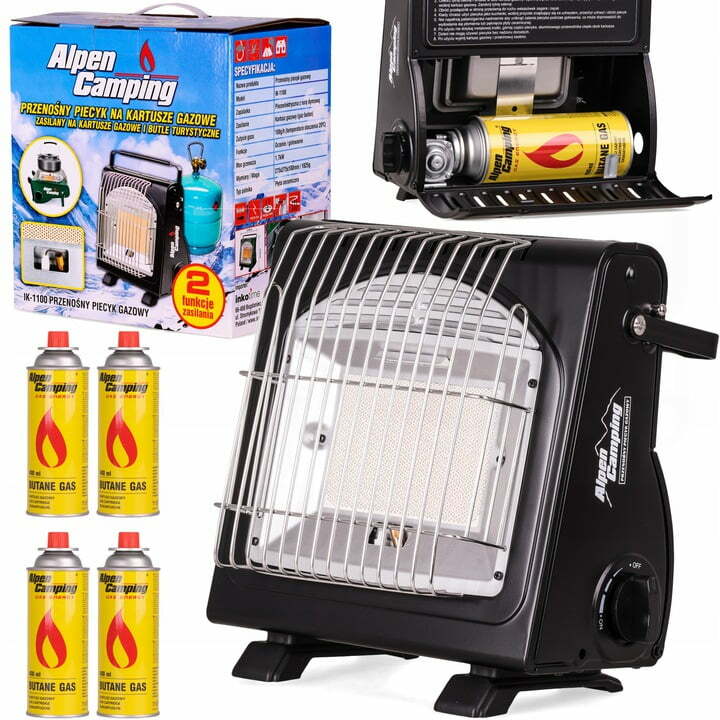
Important: The room you use the cooker in should be ventilated regularly. It is best to do this at least immediately before going to bed. To be on the safe side, you can also equip yourself with a smoke and gas detector.
Of course, you should “sweep” your wardrobe and dress warmly. If you have to, wear up to three jackets, five jumpers, and put a suit from the wedding over everything. Wrap yourself up with a duvet, blanket and anything else that will give you better thermal insulation. This is where NRC foil will come in very handy, and you should stock up on it in advance. It is very cheap (one sheet on Allegro costs less than PLN 3) and provides very effective protection against the loss of priceless heat.
The German Civil Protection and Disaster Relief Office even offers such a patent with candles and a flowerpot:
It is necessary to do everything possible to survive difficult times, but it is better to prepare for them in advance.
Water without electricity
Those of us who do not have our own independent drinking water supply will have another serious problem. A person can survive without water for a maximum of a few days, and there will be no water in the taps without electricity. An adult human needs about 2-3 litres of this precious liquid per day. So it’s easy to calculate that for drinking purposes alone, for a week, a family of four will need between 56 and 84 litres of water. This is quite a lot.
The issue of drinking water needs to be well planned and thought through. A lot depends on your circumstances and where you live. If you live in the countryside, your situation will probably be better than that of a city dweller. In many cases you will have access to wells or rainwater harvesting vessels.
Also, rivers and streams in the countryside, are generally less polluted than rivers in cities. In most cases, water from such a source – if there are no harmful chemicals in it – can be drunk fairly safely after boiling.
Nevertheless, I recommend that such water is additionally filtered before boiling. We can build such a filter ourselves, or we can buy a ready-made one. There are many models of travel filters available on the market in various configurations, but even the simplest one enables very effective water filtration, clearing it of mechanical and biological impurities.

Removes 99.9999% of all bacteria, such as salmonella, cholera and E.coli; and 99.999% of all protozoa, such as Giardia and cryptosporidium
The SawyerMINI can filter over 370,000 litres of water
With the right filter, you can even drink water from a puddle (if it is not contaminated with harmful chemicals) or melted snow (remember: never eat yellow snow ;).
As an alternative, or in addition to a water filter, water purification tablets can be used. The water tastes foul with them (like very heavily chlorinated tap water), but such purified water is reasonably safe to drink.
If you live in a city, find out if there are any “wild” springs, water intakes or wells nearby. You will be able to ‘refuel’ there if necessary. Just remember that there will quickly be a queue of people there who have had the same idea as you. Storing some water at home will also be a good option regardless of where you live.
Do you have a recreational plot of land? Start collecting rainwater there now. In summer, you will have something to water with, in case of a “W”, you will have a supply of drinking water.
In an emergency, you can even drain water from your car radiators. Do you use a boiler to heat water at home? Then you have several tens of litres of drinking water. You can also take it from the cistern in the toilet bowl. This water is no different to the water you have at the tap.
If you have a bathtub and still have time to prepare (for example, a longer blackout has been announced in the media), fill it to the brim as soon as possible. A bathtub holds about 200 litres of water, so you will have your supply for the duration of a blackout. If you don’t have a tub, fill pots, bottles and other containers you have at home.
We usually collected rainwater into 4 large barrels and then boiled. There was a small river nearby, but it quickly turned into a sewer. You have to have a lot of water containers: barrels and containers.
Important: water whose origin and purity you are not sure of, drink only as a last resort. Drinking contaminated water, can cause much bigger problems than just thirst. You can get diarrhoea and become even more dehydrated. You can get sick, which, in a situation without electricity, civilisation, hospitals and medicine, will be very dangerous. Any water from an unreliable source should at least be boiled before drinking.
Food during a blackout
Another important issue to take care of will be food. Stock up on food for yourself and your family for at least a week, preferably two weeks. Any products that can be stored for a long time will do here:
- Flour, rice, pasta, groats, semolina, oatmeal (carbohydrates)
- Beans, broad beans, peas, nuts (vegetable protein)
- Canned fish and meat, milk powder (animal protein)
- Peanut butter, oil (fats)
- Sugar, honey, chocolate, bars (energy)
- Dried fruit, sultanas, candied fruit, jam (source of vitamins)
From personal experience: the popular “Snickers” are very nutritious. 6 double snickers – that’s a daily calorie allowance for a guy[…] The idea of snickers is stolen from the Chechens. They struggle on them. You can eat along the way, a very good thing: sugar, glucose, lifts the mood (assuming you’ll be in a terrible mental and physical state – glucose is very useful).
It’s worth storing the products that go ‘down’ for us at home on a daily basis. This way, you will normally be able to eat those where the expiry date is approaching and replenish them with new, fresh ones on a regular basis.
When storing loose produce for long periods of time, there can be a problem with vermin; the main culprits here will be the storage borer and the flour moth, or colloquially, food moths.
Fighting them is not easy, but there are ways to minimise the chance of these insects invading. Store loose products such as flour, semolina and oatmeal in airtight glass containers.
In addition, any such jar filled with a food product should be placed in the oven for several minutes at about 100 °C and/or in the freezer for about two weeks. This should kill all eggs, larvae and adult insects. After this treatment, you can now store your produce safely.
You can also get special moth traps and place them in strategic locations.
Storing food only partially solves the problem of hunger. What good is flour if we don’t have anything to prepare a meal with it? Eating raw flour can be very dangerous to our health. So make sure you get a suitable gas cartridge cooker in advance, which you can not only cook with, but also heat. A standard 220g cartouche is enough for 1-3 hours’ burner operation depending on its power, which is quite a lot.
Another option would be to buy a gas cylinder, which can be refilled at a special point, for relatively little money. In some areas of Poland, such as Upper Silesia, such cylinders are standard in many kitchens.
Itmay happen that the lack of electricity will last not hours and days, but whole weeks. Particularly in the cities, this will certainly lead to great hunger. People will fight for food like animals; Dantean scenes may ensue. Even the best-stocked larder will run empty at some point. What then?
Well, then you have to eat whatever you can get your hands on: pigeons and rats, worms, stray cats. Scary? Impossible? Disgusting? You’d be surprised how quickly, when faced with hunger, people lose all resistance and their morals retreat to the Stone Age.
Have you ever been really hungry? But really?
I don’t mean a missed dinner, but a prolonged lack of food. I once did a week-long hunger strike during which I drank nothing but water. It will probably come as no surprise to anyone that my thoughts, after just a few dozen hours, revolved almost exclusively around food.
Food was also the main subject of my dreams and conversations with the friend with whom I was doing the hunger strike. I guarantee you that the feeling of hunger is one of the strongest stimuli that act on a person.
To get food, you can fish (if you have somewhere, with what and know how to do it). You can also hunt. I don’t mean hunting wild boar, but rats, starlings and pigeons. In a big city – at least for a while – there will be no shortage of these. For this purpose, it is a good idea if you stock up on an air rifle.
Shotguns in bird hunting are very effective. I myself have 2 types of airgun: one is a classic ‘break’ airgun for lead shot. It is a simple and reliable weapon with surprisingly high impact force (bottles and jars break even when hit from a few dozen metres). The second is a pistol, for CO2 cartridges and pellets, the so-called BB gun. Short guns are more manageable and do not draw undue attention to themselves, especially in the city.

Hygiene and health when there is no electricity
Hygiene and health are another matter that should not be taken lightly, especially in the extreme situations we are discussing here.
Many people have died because of hygiene problems. You need simple things in large quantities. For example, rubbish bags and toilet paper. Disposable cups and plates. Plenty. I know this because I didn’t have any.
For me, hygiene supplies are probably more important than food. You can shoot a pigeon. You can find a plant to eat. You can’t find or shoot hygiene supplies.
Make sure you have an adequate supply of essential hygiene items: disinfectant, detergent, bleach, soap, gloves.
How did you take care of your physiological needs? We used shovels and holes in the ground. Sound disgusting? It was like that. We washed with rainwater or in the river, but often the latter was too dangerous. We didn’t have toilet paper. Even if we had, I would have traded. It was a ‘dirty’ business.
Think about where you are going to take care of your physiological needs? If you live in a block of flats, you have a problem. After all, toilets haven’t worked since the first day of the blackout – after all, there’s no more water to flush. How many days will pass before the toilet bowl fills to the brim and there is an unbearable stench in the house, not to mention a bacteriological risk?
You can, of course, walk outside to a secluded place to take care of your needs, but it will probably very quickly be a “secluded place” in name only. Other people, after all, have exactly the same problem as you and will also be looking for a ‘secluded place’. In heavily urbanised areas, there aren’t that many of these again.
Here, a large supply of strong and leak-proof rubbish bags can be a good solution. In case of need number 2, we put such a bag over the toilet bowl, sit down and take care of our need in the bag. We then pull the bag off, tie it up and carry it out the door.
With number 1, things are a little easier, at least for men. All you need is a large vessel, preferably one with a tight seal, which you can take outside and empty after filling. To make things easier, you can get an adult potty – there are versions for men and women. Need number 1 is dealt with in the potty first and then poured into a larger container, which you take out and pour outside when full.
First aid kit and medicines
People often died for trivial reasons. Without medication, with limited water, simple diarrhoea will kill you in a few days.
In the stressful situation we face and when our hygiene levels are lower than usual, a simple cut can end up being fatal if an infection sets in and we don’t get to a doctor in time.
Any wound, even a minor one, should be well cleaned, washed and protected from getting wet and dirty. You will need dressings, plasters and bandages for this. In addition, to minimise the chance of the wound becoming infected, it’s worth getting some antibiotic ointment, which you can buy over-the-counter. I have tested it and it works great. Wounds heal quickly and without ‘grooming’.

Your first aid kit should also include packs of painkillers. An important medicine in your first aid kit, will also be medical charcoal. This will effectively stop diarrhoea, which can come on suddenly, whether caused by poisoning or stress.
Remember that medicines have expiry dates, so once in a while you should replace expired medications.
Lighting
For lighting, candles will suffice for a short time. However, if the blackout is prolonged, they may not be enough in the long run. So stash a torch and a supply of batteries somewhere in a drawer. Modern torches with LED bulbs, are very energy efficient and shine a bright, even light.
You could also consider buying an oil lamp and extra fuel for it. It is also worth keeping a good supply of lighters and/or matches on hand. Should the blackout last for several weeks, they will make good barter currency. The same applies to batteries.
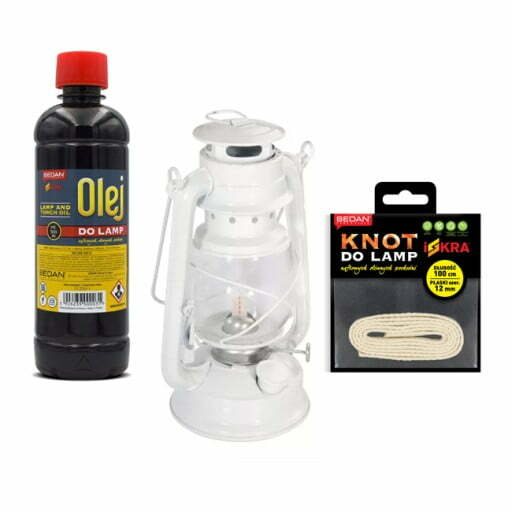
Back to candles – sometimes you will find various promotions for candle refills in large department stores. Mostly, however, they will be useless for our purposes, as they are designed to burn outside. If we use them in an enclosed space, we could be poisoned.
Radio, communications and other electronics
Stock up on a battery-operated radio, or better still, a good crank radio and solar batteries. The radio will be your window to the world. From it you will find out about incoming help (or lack of it), or listen to the weather forecast. The radio also has a huge effect on boosting morale, which is no small matter.
You can also buy a walkie-talkie set, so you can stay connected in case you need to be separated from your loved ones. It’s just important that you choose a model with replaceable batteries, as you won’t be able to use a charger in a blackout situation. The subject of batteries comes up quite often, so again I remind you to stock up on the right amount of them. You can buy whole sets of 40 on Allegro , at about £1 apiece, so it’s not a fortune.
Also equip yourself with a high-capacity power bank. This will serve as an emergency charge for your smartphone and perhaps other devices with a built-in battery. Although, in the event of a power cut, there will most likely be no GSM signal and therefore no internet connection, you can still use your smartphone for orientation (offline maps, compass) if necessary, or as a last resort as a torch.
To reduce your smartphone’s battery consumption, turn off all unnecessary functions such as Wi-Fi or Bluetooth. Also dim the screen as much as possible, as it consumes the most power. It is best to switch on the smartphone only when there is a clear need.
When help is not forthcoming – alternate means of payment
When the blackout extends beyond a dozen days, things will start to get dicey.
The most important thing is to survive for 72 hours first – this is when most people die. After that, it will happen somehow. Humans have incredible adaptive abilities, able to adjust to incredibly difficult conditions. But not everyone does. Without help, the weakest will die and within the first few days. After that, there will be a struggle for the survival of the survivors.
Money soon became worthless. We reverted to barter. For a tin of carcass (tinned meat) you could have a woman. (It’s hard to talk about, but it’s true.) Most of the women who sold out were desperate mothers.
Crisis situations bring out the worst instincts in people. In the long run, only the strongest and/or best organised survive. To be among the lucky ones, it is necessary to prepare accordingly. Some of us still remember the communist era, when shops were empty and food was available on ration cards. But people managed somehow. The following products represented the best commercial value:
- Coffee and tea
- Alcohol and cigarettes
- Sugar and chocolate
These goods circulated among people as a substitute for cash. They are easy to store and desirable.
Was salt expensive? Yes, but coffee and cigarettes were even more expensive. I had a lot of alcohol and sold it on the stump. People drank 10 times more than in peacetime.
Also good substitutes for money would be lighters, batteries and antibiotics (if you have access to them), and whatever you need at the moment.
I would like to emphasise: learn how to fix things, shoes or people. My neighbour knew how to make kerosene for paraffin lamps. He was never hungry.
It’s also worth buying a few/some silver coins. They don’t take up much space and hold their value well (you may lose a little on them, but it’s hard). Gold and jewellery will, of course, also be included in the price.
Another commodity that will become valuable very quickly will be fuel: oil and petrol. Don’t keep this in the house (noxious fumes and possibility of fire). If you have a basement, attic or cellar, this would be a good place to store fuel.
Finally
Guns, ammunition, candles, lighters, antibiotics, fuels, batteries and food. We fought for these things like animals. In such a situation, everything changes. People become monsters. It was disgusting.
My aim when I wrote this article was not to scare anyone, but to point out to you, some important aspects of surviving in a world without electricity, so that you can be well prepared for such a situation.
I have done my best to make the text as accurate and complete as possible, but I may have missed something or some information is inaccurate. If you have noticed something like this or would like to share your thoughts, please do so in a comment below the article. I read all the comments that appear on my blog and respond to most.
In conclusion, if I had to sum things up somehow, I would say this: in my opinion, surviving in a city without electricity is much more difficult than in the countryside, so if you can and have somewhere to go, you should get out of the city as soon as possible in a blackout situation.
While power cuts of a few days should not turn into a disaster, prolonged blackouts will already be very dangerous for everyone. Many of us will be counting on government-organised assistance from the army and territorial defence, but personally I would not trust the government unreservedly in this matter.
The situation could go any number of ways, a blackout and the chaos caused by it might want to take advantage of some enemy army, and then the chance of the government helping, would be close to zero.
Yes, I realise that such a scenario is unlikely, but that’s probably what the Ukrainians thought when the ‘green men’ attacked them in 2014.



